INTERVIEW: FIRE & DUST MEETS DK
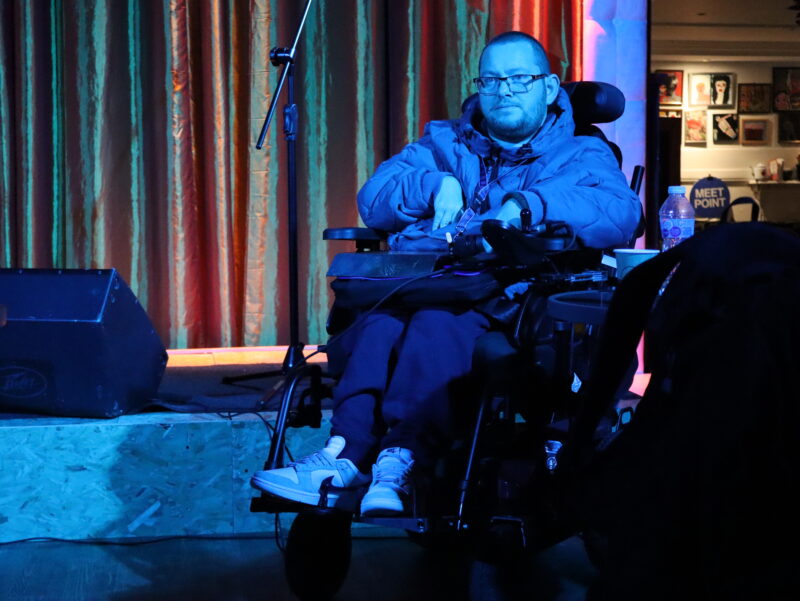
DK is a remarkable individual, a freestyle poet and a musician with exceptional skills. Dedicated to social justice, he is a passionate advocate for asexual and vegan activism, cannabis reform, animal rights, and equality. Using his platform as both performer and workshop facilitator, DK empowers marginalised communities and ensures their voices are heard. He is also a former Premier League powerchair football player for Villa Rockets and used to coach their Lions team. His debut poetry collection Off the Cuff (published by Mini Poetry Press) has been described as a showcase of human experience and emotional authenticity that reveals profound truths about the world. In recent years, DK has established AccessAbility Arts, promoting accessibility to the arts for all abilities and backgrounds.
On 14th December 2023, DK was the guest headliner at our virtual Fire&Dust poetry night via Zoom. We caught up with him after the gig, to ask a few questions…
HCE: Tell us a little about your background and journey as a writer so far. What inspired you to start writing and performing poetry?
DK: I kicked off my poetry journey back in 2017, and honestly, it was a game-changer for me as I worked to recover from alcoholism. I’d always had a bit of an interest in writing, but I never really dove in until then. It felt like the perfect outlet to express everything I was going through. Looking back, I’m so glad I finally took the plunge; writing has not only helped me heal but also brought so much joy and clarity into my life.
HCE: In your own words, what can audiences expect when they turn up for a DK performance?
DK: If people come to see me perform, they can definitely expect a heartfelt story about my journey with cerebral palsy and disability. I want to share the ups and downs, the laughs and the lessons learned along the way. My goal is to entertain people while also shining a light on what it’s like to navigate the world with a different perspective. I hope to connect with people through my experiences and maybe even inspire a few smiles!
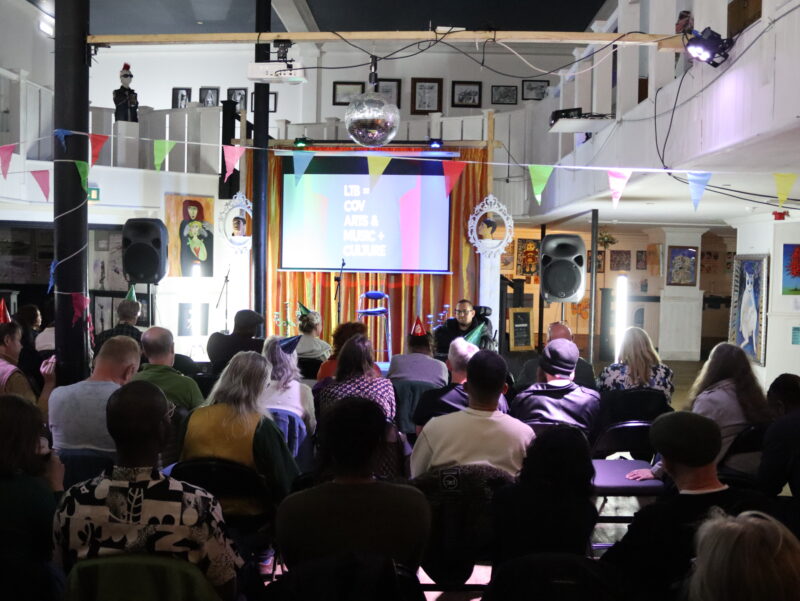
HCE: Would you say there are themes or motifs that you gravitate to in your work?
DK: In my poetry, I dive deep into themes that resonate with me personally, like disability and inequality. As a permanent wheelchair user, I often explore the challenges and triumphs that come with navigating a world that isn’t always designed for people like me. Through my verses, I aim to shed light on the everyday realities of living with a disability, while also tackling the broader issues of inequality that affect so many. I’m really passionate about these topics, and I hope my words can spark conversations and inspire change.
HCE: Who is your work aimed at – do you have an ideal audience in mind when you’re putting a poem together?
DK: I really hope my poetry resonates with everyone because I believe that art should be accessible to all. That’s why I founded AccessAbility Arts, a space where creativity knows no bounds, and everyone can express themselves freely. It’s all about breaking down barriers and celebrating the diverse talents that exist in our communities. I want my work to inspire connection and inclusivity, so that everyone feels welcome to join in and share their unique voices.
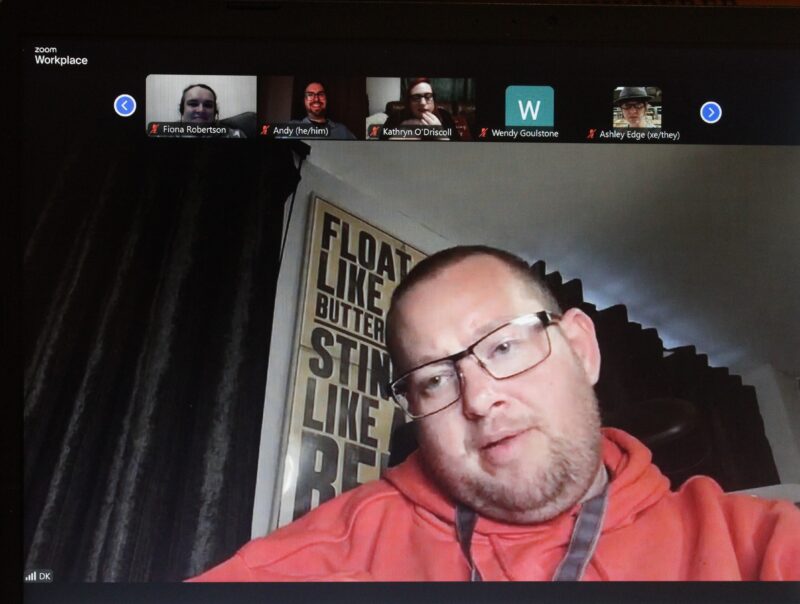
HCE: Several of the poems in Off the Cuff touch on personal topics in a raw, honest manner. Is this an emotionally draining thing to do? What is the top piece of advice you would give other poets for tackling heavy/personal topics in their writing?
DK: When it comes to writing about personal and heavy topics, my biggest piece of advice is to just be honest and tell your version of the story. It can feel daunting to open up about your experiences, but there’s something incredibly powerful about sharing your truth. Don’t worry about how it might be received – focus on what feels right for you. Everyone has their own unique perspective, and that’s what makes your story special. So, let it flow, embrace the vulnerability, and trust that your voice matters.
HCE: What have responses to your first poetry collection been like? Are readers connecting with the material in ways you hoped they would?
DK: I’m thrilled to share that my latest collection has been received really well! It’s been such an amazing journey seeing people connect with my work, and I can’t thank everyone enough for their support. I’m super excited to announce that I’ll be publishing my next collection soon! I’ve been working hard on it, and I can’t wait for you all to see what I’ve been creating.
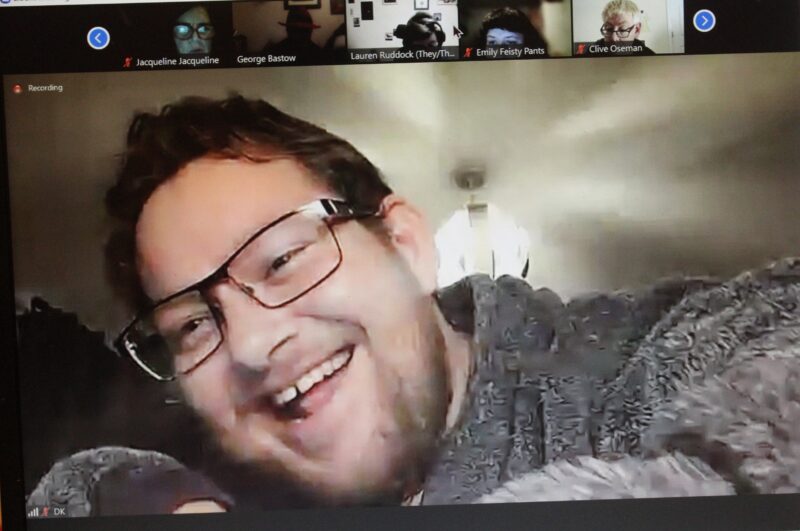
HCE: What makes poetry and spoken word an effective tool for activism, to share and spread the messages you feel strongly about?
DK: I really believe that poetry and spoken word are crucial for activism. There’s something about the way words flow in those forms that lets people express their feelings and experiences in such a raw, powerful way. It’s like a voice for the voiceless, giving everyone a chance to share their stories and connect on a deeper level. When someone stands up and pours their heart out, it not only resonates with others but also sparks conversations and inspires change. It’s an art form that can move mountains, and I think it’s so important for raising awareness and driving social justice forward.
HCE: What do you think are the most important elements for creating an effective piece of poetry for performance? Talk us through your writing process a little.
DK: When I write, it’s always sparked by something that catches my attention or strikes an emotional chord with me. Sometimes it’s a random moment I witness – maybe an interaction on the street or a news story that just doesn’t sit right – and I instantly think, “People need to know about this.” Other times, it’s a personal experience that feels too significant to keep to myself, something that’s happened directly to me that I feel compelled to share. Once that initial spark hits, I dive into research mode. I’m not someone who just throws out random thoughts; I want substance and credibility. So I’ll dig into reliable sources, cross-reference information, and make sure I understand the nuances of whatever topic has grabbed my imagination. My writing is essentially a blend of personal observation, genuine curiosity, and thorough investigation – always aiming to shed light on something I believe matters.
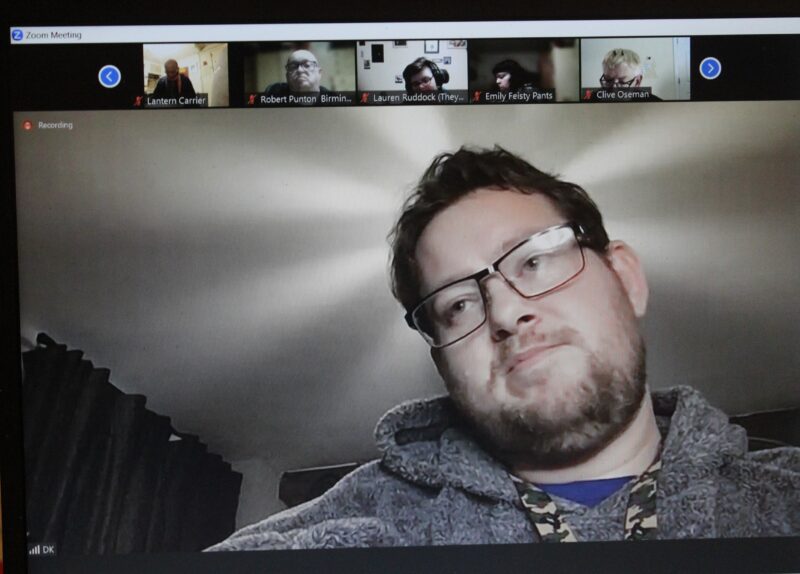
HCE: What type of poetry do you seek out for personal enjoyment? Have any collections/performers recently made an impression on you?
DK: I absolutely adore Jemima Hughes’s work! Her poetry is incredibly powerful, exploring raw and deeply personal themes. Emilie Lauren Jones has become my go-to person whenever I need poetry advice – she’s Coventry’s former Poet Laureate and does amazing workshop facilitation. Chloë Jacquet is another multi-slam winning spoken word artist who’s absolutely awesome, and I’ve got to give a massive shout-out to other incredible poets like Giovanni ‘Spoz’ Esposito, Casey Bailey, and Jasmine Gardosi. They’ve all headlined my AccessAbility Arts events, bringing their unique talents and powerful performances to our stage. These poets aren’t just performers; they’re storytellers who transform personal experiences into art that connects deeply with audiences.
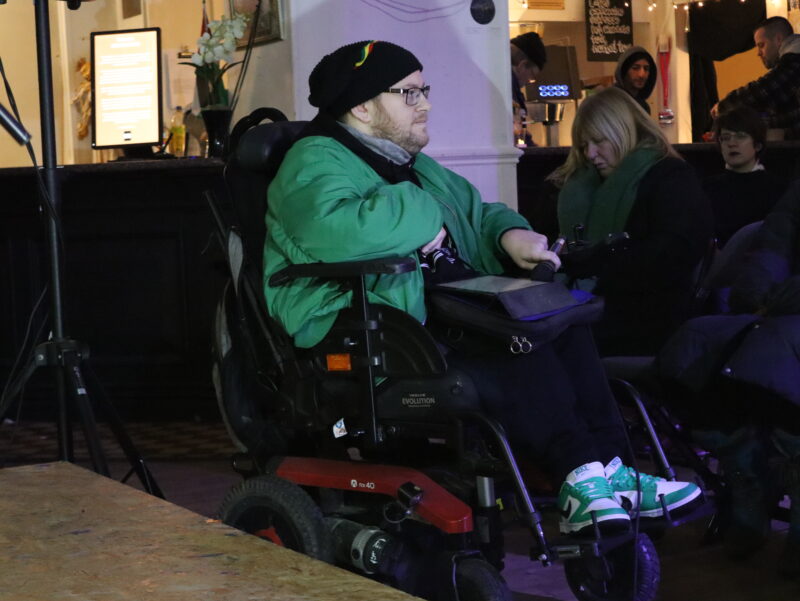
HCE: What sort of challenges or barriers have you encountered as a writer, performer and workshop facilitator who has cerebral palsy?
DK: As a writer, performer, and workshop facilitator with cerebral palsy, I have faced a variety of challenges and barriers throughout my journey. One of the main obstacles I encounter is discrimination or stereotyping based on my disability. For instance, there have been instances where people have referred to me as “that disabled guy”, which can be hurtful and demeaning. Additionally, during my performances, I have had to deal with misconceptions and ignorance from audience members, such as being patronised or overly praised for simply participating. These experiences can be frustrating, but I try to approach them with patience and resilience. Despite these challenges, I find solace in supportive and inclusive spaces like Fire & Dust, where I feel truly accepted and valued for my talents.
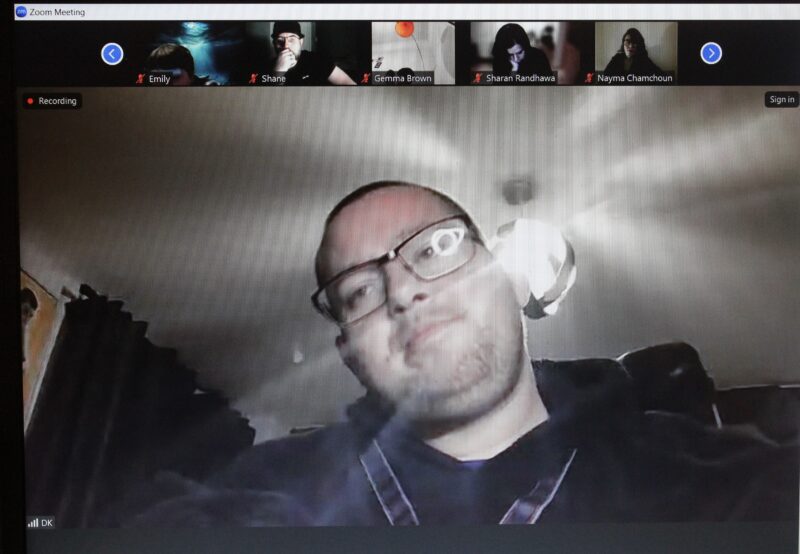
HCE: In your opinion, what more should arts communities be doing to support poets with disabilities, to make sure their voices are platformed and heard?
DK: Arts communities should be doing more to support poets with disabilities by focusing on several key areas:
Firstly, increasing representation is crucial. This includes creating dedicated prizes for disabled poets and ensuring they have leadership roles in arts organisations. Accessibility is also vital – providing adaptive technologies and making sure venues and events are fully accessible to all.
Practical support is equally important. Mentorship programs, specialised workshops, and financial grants can help disabled poets overcome unique challenges they may face.
Finally, amplifying disabled voices is essential. This can be achieved through partnerships with publishers for dedicated anthologies, organising inclusive poetry readings, and actively promoting their work across various media channels.
The ultimate aim should be to move beyond mere accommodation to actively celebrating the unique perspectives and artistic contributions of disabled poets within the broader literary community.
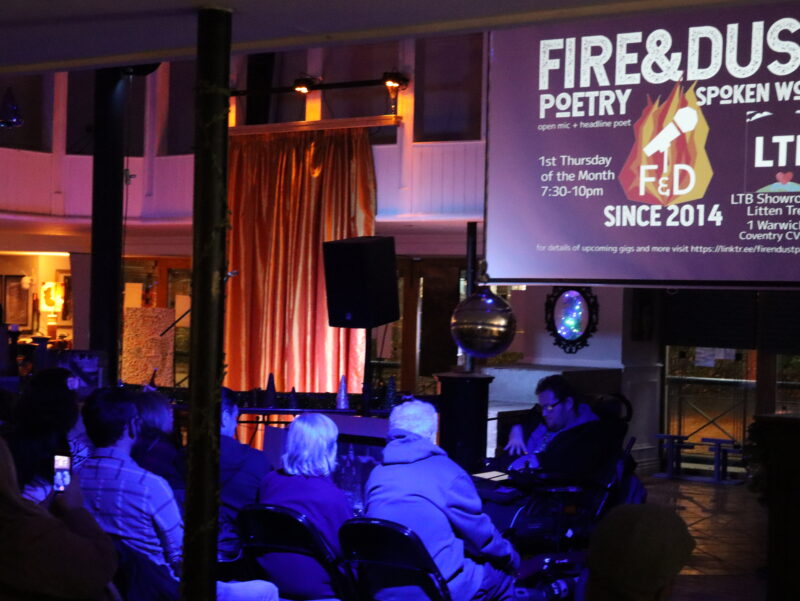
HCE: What’s next on the horizon for you? Are you already working on projects/booked for upcoming performances?
DK: I’m super excited to share that I’ll be publishing my next collection through AccessAbility Arts! Their mission to celebrate creativity and inclusion is exactly what I’ve been looking for. This January, we’ll be launching online, and in February, we’ll have some incredible in-person events. I can’t wait to dive deep into my personal story and share my experiences through their platform. They’ve been amazing at creating a welcoming community for artists of all abilities, and I’m thrilled to be part of their upcoming workshops this year. The organisation, co-founded by me, has been doing incredible work in providing a space where every artist’s voice can be heard and cherished.
HCE: What’s the best way for people to keep connected with you and your work, or contact you about bookings?
Facebook LinkTree – AccessAbility Arts Instagram
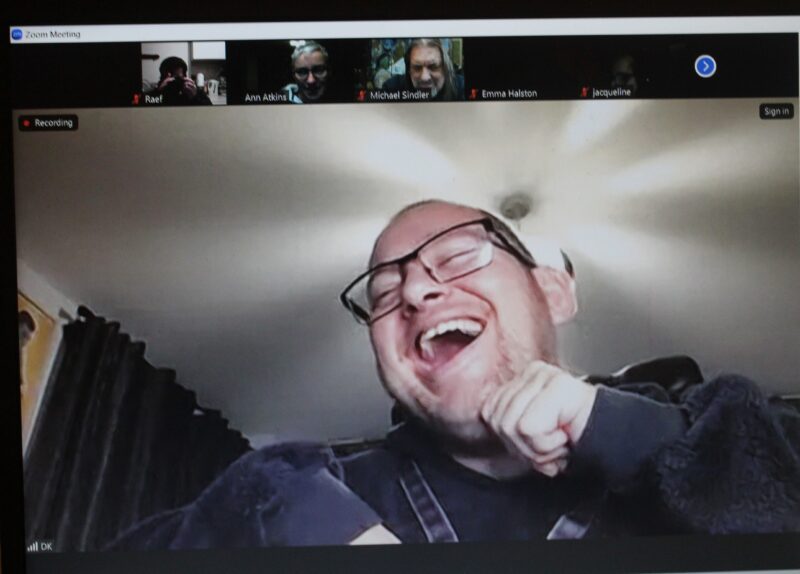
HCE: Is there anything we didn’t cover that you’d like to share with our readers?
DK: I don’t think you’ve missed anything significant during our conversation, but I genuinely want to express my appreciation for this interview. Your questions were thoughtful and engaging, and I’m truly grateful for the opportunity to share insights and perspectives. Moreover, I’m absolutely open to potential future collaborations – whether that involves exploring new ideas, diving deeper into specific topics, or finding creative ways we might work together. I’m excited about the possibilities and appreciate the time and energy you’ve invested in our discussion.
DK’s collection Off the Cuff is available to purchase online, direct from publisher Mini Poetry Press, as well as other bookshops and retailers.
